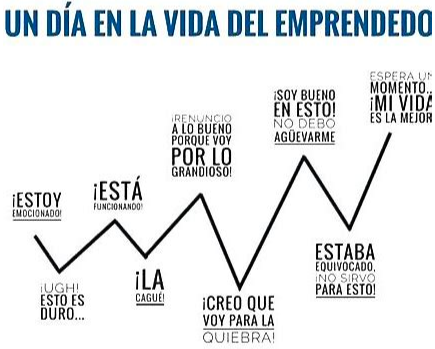THE ENTREPRENEUR'S ROLLERCOASTER. UNDERSTANDING THE EMOTIONS OF AN ENTREPRENEUR
Entrepreneurship is a rollercoaster of emotions: uncertainty, fear, insecurity, anger, loneliness, euphoria, impatience, frustration, stress, demotivation, immaturity, laziness .... How do you deal with it all?
Entrepreneurship is a really tough thing, which is going to totally test us emotionally as people. Our self-confidence, determination, courage and, above all, common sense will be put to the test.
And, as such, still at the same time these two antagonistic points of view
MANIC-VISIONARY-OPTIMISTIC: for entrepreneurship is It requires an almost messianic feeling that we are going to succeed, That we are going to eat the world and that we are destined for it. That if we work hard we will achieve everything we want.
DISBELIEVER-PESSIMIST-SENSATE: but for entrepreneurship, too, it is We need a certain amount of disbelief that forces us to question day by day whether we are doing it right, if the path we have adopted is the right one... and be acutely aware that we are likely to fail.
And, the hard part is not to let either of the two disorders dominate us... something impossible at the beginning, which leads us to suffer one of the most complicated situations in entrepreneurship: the entrepreneur's roller coaster. Because the road to success is more complicated than we have been told.
Every day we will be challenged. We are going to work harder than we thought possible, to live with a lot of stress outside our comfort zone for a long time, and to wrestle with issues we have no idea about...something that is not only emotionally draining but it will challenge us as people. But as he said Neale Donald Walsch
"Life really begins at the end of your comfort zone".
The entrepreneur's roller coaster is what we call the continuous ups and downs that one goes through when starting a business. That makes you feel like the king of the world one day and the next a wretch who will end up bankrupt. And suffering it is not bad, it is normal, don't feel like a freak, it is something that happens to everyone when they start a business.

The important thing is to be aware of this and to act accordingly... because what happens to us when we undertake is worthy of a film:
In the we are pathological optimists, and we tend to overestimate (despite all the warnings and signs) the chances that things are going to work out, that we are going to be successful. We reject any negative comments (see+ TIP entrepreneur in love) with a gesture, because, all we see is wads of €100 notes raining from the sky, and we imagine ourselves in success... which makes the first stumble all the harder.
After the first pothole, Our motivation drops a bit but we still believe in our chances... even if there is no reason to do so. We have not yet hit rock bottom, and it is not unusual for us to keep falling. And although officially we will continue to without paying any attention to the ashen people who keep saying that we are going to fail, in reality we are beginning to consider the possibility.
There is a point where optimism is replaced by terror. The feeling of "where have I got to"... and then suddenly we realise where we have really got to. The difficult thing is to bring our idea to fruition. We realise that the statistics on company closures are also with us and that they can affect us... and that we may lose everything.
This is followed by a time of absolute disorientation where uncertainty is at its peak... and where we feel lost. And not knowing which way to go makes us feel that we have made a mistake, that we are impostors, that surely a "good" entrepreneur would know what to do (nothing could be further from the truth). Breaking negative thought patterns is key here (see+ TIP) that will only sink us deeper and kill our creativity and passion.
Many people at the previous point decide to close their business, give up and give up their passion, because they believe that entrepreneurship is not for them. And that may be so, but the reality is that they have not given themselves enough time to explore, to pivot the idea and look for other ways of executing it. To regain their enthusiasm.
But what has happened to them is normal, there is a statistic that says that a company pivots on average 2.7 times before it succeeds... so maybe you have to get up again and look for another way. Change the plan, but don't change the target.
At this stage it is critical not to get carried away by self-pity, and to relativise our situation. It is something that happens to all entrepreneurs. It happens to everyone. So we'd better stop complaining and start building. At this point it is key to separate oneself from people, news and negative readings and to regain self-confidence... Because this is really about believing that we are really capable. It's about having passion.
If we have achieved After overcoming the previous phase and regaining passion, it is common to finally find another path, possibly different from the one we had in mind... but a path nonetheless. And we get some clients, some "momentum" and we go "up" again... and we fall back into a manic phase where we are convinced that we are going to take over the world... just before we hit another crash. And then it starts all over again.
Neither experience nor time makes the roller coaster disappear. It just means that the falls are not as steep and the climbs are not as steep. It teaches us to to take the knocks and not to spend too much time feeling sorry for ourselves.
To listen to everyone, both the critics and those who believe in us... but without paying too much attention to either, drawing your own conclusions. To keep your family and partner close, since, they will be your seatbelt on this complicated and tough journey. And we must be prepared for failure... trying of course to fail "small", but drawing all the lessons from the process.
AND ABOVE ALL, REMEMBERING THAT:
The important thing is not how many times you fall, but how many times you get up.
In the end, the key is not to sink too low when you are down, and not to swell too high when you are up. You are living the entrepreneurial rollercoaster, so have common sense and put your situation in perspective.
Once you are on the roller coaster you have only 2 options: you can clinging with all your might to the railing and screaming in terror, or you can enjoy the journey... because you won't be able to get off.
TASK
NOW THAT YOU ARE CLEAR ON WHAT THE ENTREPRENEURIAL ROLLERCOASTER LOOKS LIKE, REFLECT ON YOUR EMOTIONS:
- Identify situations where you felt you were at the top of the roller coaster and situations at the bottom of the roller coaster.
CASE STUDY
Juan is a young entrepreneur who decided to leave his job in a company to start his own technology startup. At first, Juan was very excited and optimistic about his project, he was sure it would be successful. But he soon realised that entrepreneurship was much more difficult than he thought and that uncertainty and stress were constant in his life.
During the first few weeks, John worked hard on his project, but soon faced difficulties that led him to feel frustrated and insecure. He was having difficulty getting clients and money was starting to dry up. Despite his situation, John tried to keep a positive attitude and keep going, but at times he felt overwhelmed by the fear of failure.
After a few months, Juan managed to get some clients and started to generate income. But just when he thought things were looking up, one of his clients cancelled his contract and Juan felt discouraged again. The lack of financial stability and the uncertainty of not knowing when more clients would arrive made him anxious and depressed.
Despite the difficulties, Juan kept working on his project and looking for new opportunities. At times he felt elated and optimistic, and at other times he felt dejected and frustrated. The entrepreneurial rollercoaster was real for him and he was experiencing it first hand.
His mentor, Peter, realised that John was going through a difficult time and decided to talk to him to better understand his feelings and emotions. Peter asked him how he was feeling at each stage of the project and how he was coping with the difficulties. Juan confessed that he sometimes felt alone and did not know where to turn for help.
Pedro advised him to find a group of entrepreneurs with whom he could share his experiences and feelings, and not to be afraid to ask for help when he needed it. He also reminded him that it was normal to feel overwhelmed and that all entrepreneurs go through difficult times.
Thanks to the support of his mentor, Juan was able to better understand his feelings and emotions and find new ways to deal with the entrepreneurial rollercoaster. He learned that it was important to keep a positive attitude and keep going despite the difficulties, and that the support of other entrepreneurs and mentors could make a difference in his entrepreneurial journey.
QUIZ
After the question and before think of yourself.
You can also consult other Related TIPs.
Learn more about mentoring by downloading this free EBOOK.
Do you want to help an entrepreneur by sharing your experience as a MENTOR? get accredited now.
Are you an entrepreneur? If you need support to boost your business, apply now for your mentor.
Rate this TIP!
Click on the stars to rate
Rating "4" - Average " - Average4.5"
No votes yet, be the first to vote!
We are sorry you did not find it useful.
Help us improve this TIP!
Leave us a comment and tell us how you would improve this TIP










